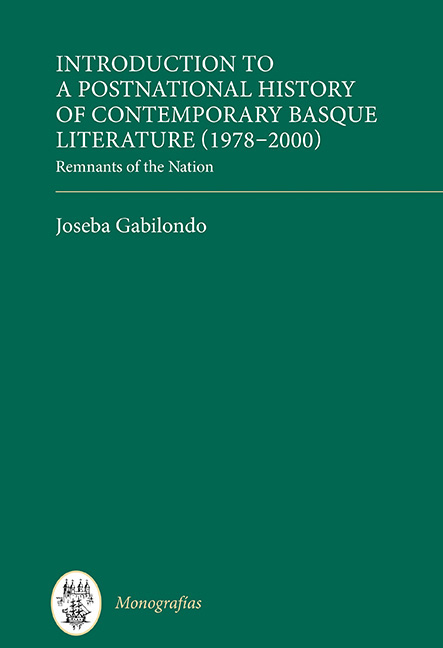 Introduction to a Postnational History of Contemporary Basque Literature (1978–2000)
Introduction to a Postnational History of Contemporary Basque Literature (1978–2000) Book contents
- Frontmatter
- Contents
- Preface and Notes on the Translation
- Acknowledgements
- I Postnational Theory and History
- II Writing the Nation: On Atxaga's Ethiopia and Obabakoak (1978-92)
- III After the Nation: Hybrid Postnational Literatures (1992-2000)
- 7 Before Babel: Globalization, Ethnic Hybridity, and Enjoyment
- 8 Terrorism as Memory: Historical Novels and Masochist Masculinity
- 9 Maternal Exile: Women Writers, Cultural Politics, and Individual Utopia
- 10 Melancholic Migrancy: Writing a Postnational Lesbian Self
- 11 Nationalist Crisis: Women's Literature and Neoliberalism
- Epilogue: Basque Literatures 2001-17
- Works Cited
- Index
11 - Nationalist Crisis: Women's Literature and Neoliberalism
from III - After the Nation: Hybrid Postnational Literatures (1992-2000)
Published online by Cambridge University Press: 06 September 2019
- Frontmatter
- Contents
- Preface and Notes on the Translation
- Acknowledgements
- I Postnational Theory and History
- II Writing the Nation: On Atxaga's Ethiopia and Obabakoak (1978-92)
- III After the Nation: Hybrid Postnational Literatures (1992-2000)
- 7 Before Babel: Globalization, Ethnic Hybridity, and Enjoyment
- 8 Terrorism as Memory: Historical Novels and Masochist Masculinity
- 9 Maternal Exile: Women Writers, Cultural Politics, and Individual Utopia
- 10 Melancholic Migrancy: Writing a Postnational Lesbian Self
- 11 Nationalist Crisis: Women's Literature and Neoliberalism
- Epilogue: Basque Literatures 2001-17
- Works Cited
- Index
Summary
Introduction: the event of ‘women taking over Basque literature’
In the 1970s or earlier, any work written in Basque with a modicum of quality would have been welcomed with great joy by any reviewer in traditional Basque journals such as Jakin, Argia, or other more obscure publications – obscure because of Franco. There was not much written in Basque at the time and perhaps, because the connection between Basque language and nation was automatic, welcoming enthusiastic reviews did not arouse anyone's suspicion. However, if I was to review Lourdes Oñederra's novel Eta sugeak emakumeari esan zion (And the Serpent Said to the Woman, 2000) and present it with the same level of unmediated alacrity and support, not because the novel is written in Basque (pro patria) but because it is written by a woman – because it has managed to put down in letters masterfully the inner chronicle of an individual – then two thirds of the readers (among them many women) would react against my review with accusations of multicultural favoritism. They would argue that my approach amounts to ghettoizing women, that I would not be able to define what women's literature is, that I am just sowing discord… Reactions such as these and others, fully charged unconsciously, would travel faster than the speed of light. Granted, because the enthusiastic reviews of old times were written on behalf of the nation, they were seldom questioned, except, that is, by the ‘pro–Spanish’ or españolistas. Yet this time, perhaps because women do not have their own ‘motherland’ (except for Amazonia and California, as the latter was also populated by black Amazons according to Renaissance writer Garci Rodriguez de Montalvo), it is quite clear that gender identity does not elicit the same unity of purpose that nationalism does.
One should recall how those who questioned the blind welcome to any Basque work back in the 1960s and 1970s, just because it was written in Basque, were called españolistas pejoratively. Then, should one not use the word ‘masculinist’ (machista) to describe those who might have denounced this imaginary review of mine because it was partial to or conditioned by gender? – and I insist, some women would also join in the denunciation. The Basque map of social and cultural identities is increasingly complicated: Basques, women, gays, immigrants…
- Type
- Chapter
- Information
- Introduction to a Postnational History of Contemporary Basque Literature (1978–2000)Remnants of the Nation, pp. 269 - 296Publisher: Boydell & BrewerPrint publication year: 2019


